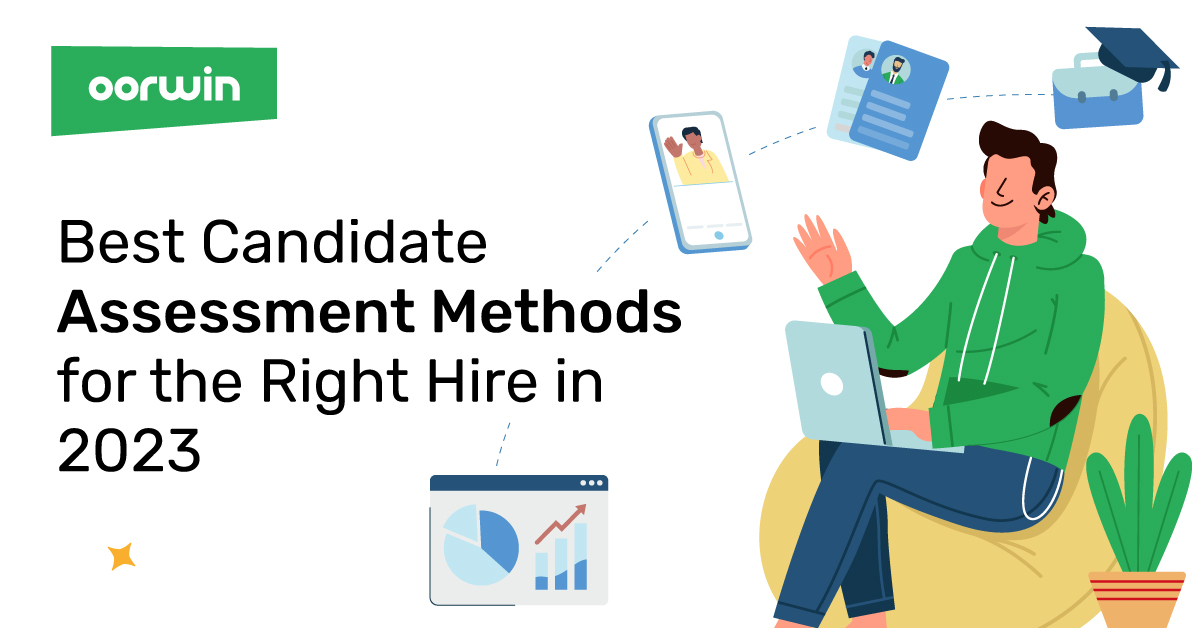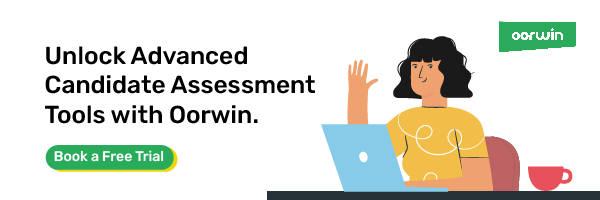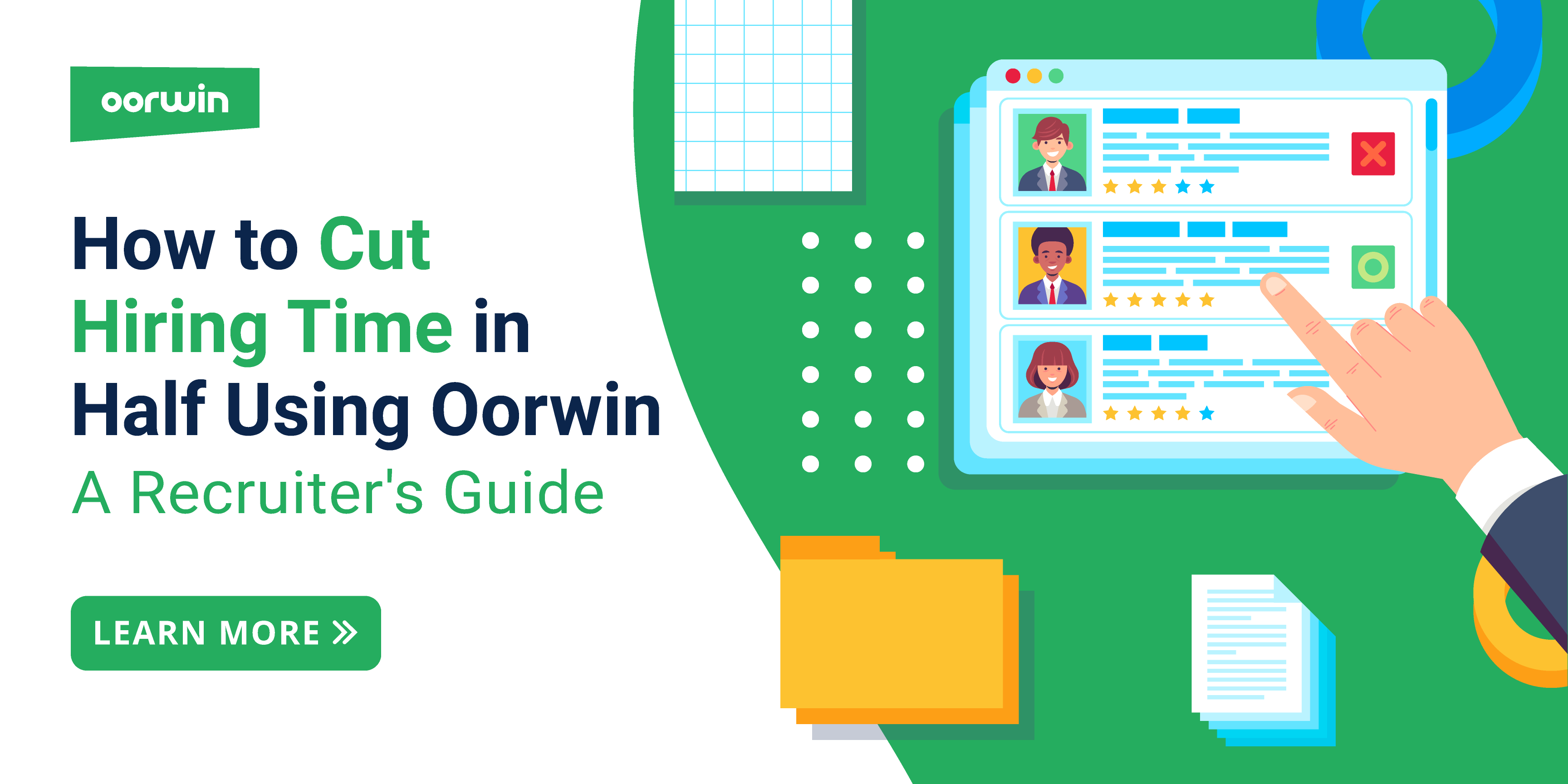Best Candidate Assessment Methods for the Right Hire in 2023
Oorwin
7min read / 23 Dec 2022

Related Articles
What are Candidate Assessment Methods
Candidate assessment methods are an essential part of the HR process for any company. These methods allow companies to evaluate the performance and potential of their employees, identify areas for improvement, and provide feedback and support to help employees grow and succeed in their roles. However, with so many different hiring assessment methods available, it can be overwhelming for companies to choose the right ones for their needs.
What are the Objectives of a Candidate Assessment Method?
Candidate assessment methods used in the hiring process have several key objectives to ensure effective and efficient hiring processes. These objectives include:
Facilitating Unbiased Hiring: The primary goal is to create a fair and unbiased evaluation process that helps identify the most qualified candidates for a given position.
Ensuring a Fair Candidate Experience: It is essential to design assessments that provide candidates with a positive experience, regardless of whether they are ultimately selected. This contributes to a favorable perception of your organization.
Enhancing Efficiency and Cost-Effectiveness: Candidate assessments should streamline the hiring process, saving time and resources by identifying the best-fit candidates more efficiently.
Identifying the Best Hire: The assessments should effectively distinguish top candidates from the applicant pool, making it easier for recruiters and hiring managers to make informed decisions.
Maintaining a Pipeline of Qualified Candidates: A well-structured assessment program should also help you create a pool of qualified candidates for future openings, building a talent pipeline.
Types of Candidate Assessment Methods Used in the Hiring Process
Using the assessment methods in the hiring process needs a good pair of hands who should be both knowledgeable and skillful. Nowadays, these assessment methods are usually conducted using candidate assessment tools. Among the most used assessment methods include –
- Mental and Physical Ability Tests
- Achievement Tests
- Biodata Inventories
- Personality Inventories
- Education and experience requirements (including licensing and certification)
Mental and Physical Ability Tests
Mental and physical ability tests are crucial for employers to identify the most qualified and capable candidates for a job. This candidate assessment in the hiring process can help companies make informed decisions about who to hire or promote, ensuring they have the necessary skills and capabilities to succeed. Through these tests, individuals are judged on their eagerness to learn, how to manage their job responsibilities, the labor they can put in, etc.
It is further differentiated into general and specific ability tests, where broader mental abilities like verbal, reasoning, computing, communication, reaction time, mathematical, and written comprehension skills are measured, respectively.
Achievement Tests
Achievement tests, or proficiency tests, are one of the most used candidate assessment methods in the hiring process. They help to measure the candidate’s knowledge, skills, and abilities in a particular subject or area.
- Knowledge tests – This is where a candidate is asked to respond to several questions that will determine precisely how aware they are about the job role. They may cover a wide range of topics, depending on the job requirements and the specific skills and knowledge needed to succeed in the role.
- Performance tests – A candidate will be given a task to solve. For example, if an organization hires a computer mechanic, he will be asked to sort out a malfunctioned computer.
Biodata Inventories
These are standard questionnaires to determine individuals’ biographical information, including their education, work experience, skills, etc.
Often, organizations need help executing this method as some candidates can put the wrong information regarding them in the questionnaire In that case, resumes and internal consistency checks can help the organization verify.
Biodata inventories are often combined with other assessment methods used in the hiring process, such as interviews, aptitude tests, and personality tests, to understand an individual’s strengths and limitations comprehensively.
Personality Inventories
Personality inventories come among the unique candidate assessment methods. This hiring assessment method involves measuring an individual’s personality traits or characteristics that will make them an excellent hire for the organization.
Some common features measured in personality inventories include self-confidence, motivation, and how fast they can get comfortable with the working environment. These psychological attributes greatly matter. A person with good knowledge and skill can deliver even better if the motivation or self-confidence is higher.
Education and experience requirements (including licensing and certification)
Education and experience requirements are among the most distinguished hiring assessment methods to evaluate a candidate’s potential for success in a particular job or role. When a company posts for a job, they mention that candidates with a specific degree are eligible to apply or individuals with certain areas of expertise or skills are suitable for the job.
Suppose a company is looking for a news editor. In that case, it may advertise that people with a degree in media or relevant experience working as an editor in a newsroom will be considered.
Popular Candidate Self-Assessment Methods
In addition to the assessment methods used in the hiring process, as discussed above, some self-assessment methods are also popular among employees, employers, and organizations.
Self-assessment primarily helps self-evaluate, and it can determine whether a person wants to work in a particular company or whether the requirements of both sides match. Here are the following ways to avail –
Work-Related Values
Work-related values are values an individual believes are essential on a personal level. It can include flexible hours, job security, autonomy, and a balance between private life and work.
These assessment values will help an individual understand whether he wants to work in that place, making the process one of the best assessment methods used in the hiring process.
Interests
The interests of candidates will help determine how well they will fit in a particular company. For example, a sports person might need to improve in an educational organization, or a computer engineer may be best suited to work in a software company.
Personality Types
Employers look for specific personality types that suit best for their companies. These are primarily a person’s needs, attitudes, professionalism, etc. An individual’s personality can significantly determine if he can adapt to a particular type of work or the work environment.
Abilities
The ability factor is always considered when screening candidates by these assessment methods used in the hiring process. A person’s abilities will justify whether they are fit for the job. Though people can also master various skills and abilities through practice and training, the ability test evaluates the candidate’s learnability.
Benefits of Self-Assessment Methods
Self-assessment methods used in the hiring process are unique and give effective results. Some of the benefits that these techniques can administer are –
- It gets easier for employers to assess as they get a clearer picture of the employees.
- Candidates exchange productive discussions with staff, who get involved in their evaluation.
- It helps employees understand their strengths and weaknesses, and they can groom themselves accordingly.
- Self-assessment methods can help mitigate unconscious bias in the hiring process.
- Self reflection helps in the learning process. A study by Harvard shows learning and reflection are closely linked, having effects of one on the other.
Harnessing the Power of Candidate Assessment Tools
Candidate assessment tools are revolutionizing the recruitment process. These digital platforms provide an objective analysis of a candidate’s skills, personality, and suitability for a role. They can include psychometric tests, skill-based assessments, and even AI-driven interview analytics. By using these tools, companies can streamline their hiring process, reduce bias, and select the most qualified candidates for their team.
Some of the popular Candidate assessment tools in 2023 are
- Harver: Harver is a well-known candidate assessment tool that specializes in predictive analytics for talent acquisition. It combines candidate assessments, video interviews, and other tools to build a comprehensive candidate profile.
- Hire Success: Hire Success offers pre-employment tests that measure cognitive abilities, personality traits, and skills.
- iMocha: iMocha is a versatile talent assessment tool that covers a wide range of skills, from coding and technical skills to language proficiency and soft skills.
- Vervoe: Vervoe’s platform integrates skills assessments and practical tasks that simulate real job situations, providing recruiters with valuable insights into a candidate’s abilities for more precise evaluation.
- Testlify: Testlify simplifies technical hiring by providing coding assessments and challenges. Its collection of coding tests spans various programming languages and frameworks, allowing recruiters to assess a candidate’s coding proficiency accurately.
The good news is you can access Testlify within Oorwin platform only with the new integration. As an AI-enabled platform designed solely to ensure recruiter ease and maximum talent engagement,
Oorwin also offers some other candidate assessment tools. Know more about the integrations here. Book a free demo to explore assessment tools and many other integrations in oorwin.
Frequently Asked Questions
What are the standard methods that are used when hiring new employees?
Some standard methods used while hiring new employees are – direct advertisement, promotion, transfers, boomerang employees, candidate assessment tools, etc.
Why is employee performance assessment important?
Performance assessment helps in evaluating the employees with accuracy. It assists employers in finding quality candidates that can be best suitable for their organization. These evaluations are objective and based on real-time data; hence, they are highly trustable.
How do you make an employee assessment?
To make an employee assessment, employers generally review the job description of the employees, highlight their areas of improvement, compare their strengths and weaknesses, and recommend actions to take accordingly.
Popular Articles..
Blog

6min read / 25-Jun-2025
Master Effective Interview Techniques with Oorwin: A Step-by-Step Recruiter’s Guide
Blog
Blog
Get the latest Oorwin releases, updates, success stories & industry news
 Back
Back

